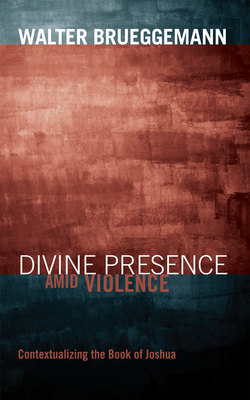Читать книгу Divine Presence amid Violence - Walter Brueggemann - Страница 5
На сайте Литреса книга снята с продажи.
Introduction
ОглавлениеThe conviction that Scripture is revelatory literature is a constant, abiding conviction among the communities of Jews and Christians that gather around the book.1 But that conviction, constant and abiding as it is, is problematic and open to a variety of alternative and often contradictory or ambiguous meanings.2 Clearly that conviction is appropriated differently in various contexts and various cultural settings.3 Current attention to hermeneutics convinces many of us that there is no single, sure meaning for any text. The revelatory power of the text is discerned and given precisely through the action of interpretation which is always concrete, never universal, always contextualized, never “above the fray,” always filtered through vested interest, never in disinterested purity.4
If that is true for the interpretive end of the process that receives the text, we may entertain the notion that it is also true for the interpretive end of the process that forms, shapes, and offers the text. That is, not only in its hearing, but also in its speaking, the text makes its disclosure in ways that are concrete, contextualized, and filtered through vested interest. While this leaves open the charge of relativism, it is in fact only a candid acknowledgment of the central conviction around which historical-critical studies have revolved for two hundred years. Historical-critical studies have insisted that a text can only be understood in context; historical-critical study believes historical context is necessary to hearing the text. But our objectivist ideology has uncritically insisted that knowledge of historical context of a text would allow us to be objective interpreters without recognizing that from its very inception, the textual process is not and cannot be objective.5
Historical-critical study thus gives us access to a certain interpretive act that generates the text, but that original interpretive act is not objective. This acknowledgment of the formation of the text as a constructive event is a recognition of what we know about ourselves, that we are not only meaning receivers, but we are also meaning makers. We not only accept meanings offered, but we construct meanings that we advocate.6 The receiving, constructing act of interpretation changes both us and the text. This suggests that Scripture as revelation is never simply a final disclosure, but is an ongoing act of disclosing that will never let the disclosure be closed. The disclosing process is an open interaction with choices exercised in every step of interpretation from formation to reception.
Elsewhere I have summarized our situation with regard to knowing and interpretation:
In place of objective certitude and settled hegemony, we would now characterize our knowing in ways that make mastery and control much more problematic, if indeed mastery and control can any longer be our intention at all. I would characterize our new intellectual situation in these rather obvious ways:
1. Our knowing is inherently contextual. This should hardly come to us as a surprise. Descartes wanted to insist that context was not relevant to knowing. It is, however, now clear that what one knows and sees depends upon where one stands or sits . . .
2. It follows that contexts are quite local, and the more one generalizes, the more one loses or fails to notice context. Localism means that it is impossible to voice large truth. All one can do is to voice local truth and propose that it pertains elsewhere. In fact, I should insist that all our knowing is quite local, even when we say it in a loud voice . . .
3. It follows from contextualism and localism that knowledge is inherently pluralistic, a cacophony of claims, each of which rings true to its own advocates. Indeed, pluralism is the only alternative to objectivism once the dominant center is no longer able to impose its view and to silence by force all alternative or dissenting opinion.7
1. Tracy has usefully interpreted this conviction in terms of the Bible as a “classic”; The Analogical Imagination, chapters 3–7.
2. See Kelsey, The Uses of Scripture in Recent Theology.
3. Sobrino has shown how “the Enlightenment” as a context of interpretation can be handled in two very different ways, depending on whether one organizes the matter around Kant or Marx; The True Church and the Poor, 10–21. Obviously Kant and Marx were interested in very different notions of what may be enlightened, and the implications for interpretation lead in very different directions. This difference is illustrative of the interpretive options more generally available.
4. Habermas has shown how all knowledge is related to matters of interest, and that any imagined objectivity is likely to be an exercise in self-deception; Knowledge and Human Interests. On such presumed objectivity, see Schüssler Fiorenza, Bread Not Stone; idem, Rhetoric and Ethic: The Politics of Biblical Studies.
5. See the helpful statement by Dorr, Spirituality and Justice.
6. On the human person (and derivatively the human community) as a constructor of meanings, see Kegan, The Evolving Self; Schafer, Language and Insight; and Berger and Luckmann, The Social Construction of Reality.
7. Brueggemann, Texts under Negotiation, 8–9.
